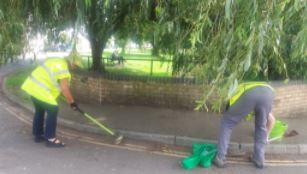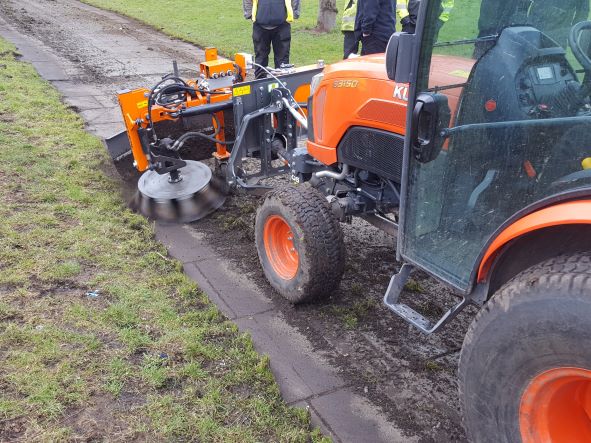Weed Management - It's time for significant change.
With a new national action plan for the sustainable use of pesticides on the cusp of being released we have seen a swathe of councils taking a more responsible look at managing weeds.
This new energy is encouraging, but after councils have made the bold decision to reduce or eliminate their use of plant protection products - what next?
Now is the time for a big change in the way we manage our highways and parks. Councils should not simply be trialling alternative products, but looking for an entirely new approach. In doing so, they can deliver much more sustainable management of our outdoor environment and reduce costs at the same time.
Cultural Change -
We can get the public onboard to reduce the cost of weed control.
If they park their car on the road outside their house it makes sweeping the kerb difficult - can we encourage them to help us by moving their car when sweeping is planned, or by cleaning up detritus in front of their own house? Can they keep their hedges cut back, so they aren't overhanging paved surfaces? Communication is key - many people would volunteer to do these things if they knew it was important to keeping their street tidy. People want to feel pride in their surroundings, let's help them achieve it.
Lambeth council have made progress with this strategy. Cllr Adilypour said: “The response to the Community Weeding Scheme was amazing and we want to say a big thank you to everyone who has been taking part. By Spring 2021 around 150 streets were participating, contributing to a significant reduction in the amount of glyphosate sprayed in the borough and demonstrating that weeds can be managed without chemicals.

Image from http://www.hisimp.net/wp/weeding-in-the-community/?doing_wp_cron=1642775629.6817309856414794921875
Biological Change -
We can make different plant choices that will reduce the cost of battling weeds.
Many councils have started looking to plant wild flowers.
We have to be careful to avoid inadvertently creating an augmented seedbank of less desirable species which dominate and spread easily to adjacent bare soil. Careful selection of plants is crucial. The right plant in the right place.
How about ground cover plants in smaller areas around trees, or on slopes? Changing from grass to ground cover will increase flowers for pollinators such as bees, whilst also reducing the amount of maintenance required for grass. Grass requires continual cutting throughout much of the year, it is expensive to look after. Many ground cover plants only need trimming around once per year and cause far less mess to collect than grass. They may also naturally suppress weeds.
Using low maintenance evergreen hedges instead of fences, will also add to the biodiversity, whilst reducing weeds and maintenance costs - trimming a hedge once per year.
Stroud Council has " committed to undertaking grounds maintenance using methods which have minimum damaging impact on the natural environment. In keeping with this it will:
- Prevent by design. Whenever there is the opportunity to influence the design of new features or modify existing ones, control of weeds will be considered when determining materials, siting, angles etc. At all times, preference will be given to incorporating design features which will minimise weed growth. Ground covering plants will be preferred where appropriate over other types of plant.
- Prevent by maintenance. Routine maintenance such as sweeping of hard surfaces, mulching etc. will be undertaken as required, as will weeding by hoe and hand where appropriate. This policy will apply to Council staff, the areas for which the Council is responsible and to all contractors working on those areas. The Council will identify and list areas under its control where weed control is not required and amend this when circumstance or land under its control change."
The RHS has some great advice on ground cover plants for weed reduction;
https://www.rhs.org.uk/plants/types/shrubs/ground-cover

Image from https://www.gardeningknowhow.com/special/slope-hill/hill-ground-cover.htm
Mechanical Change -
Councils and Contractors need to understand how to combine the best equipment to make weed management as successful as possible. For example by combining a sweeping and weed ripping regime with heat treatment we can greatly reduce the number of applications required, saving money on repeated treatments. This is because, by reducing the soil on hard surfaces we significantly reduce new weed growth opportunities and restrict the types of weeds you will see to those that grow in shallower soil. In turn these weeds are significantly easier and quicker to kill with heat than those that grow in deeper soil.
We can further aid our mission by sealing cracks and joints in our roads and pavements, reducing points where soil can be trapped.
Not only can the right approach save money by reducing the volume of applications, it can also save significant sums in surface repair or replacement, as a well maintained, clean surface will be much more resistant to freeze thaw and other destructive processes.
Edinburgh council have seen great success in reducing the amount of glyphosate they use by combining quad bikes applying pesticides with weed rippers on tractors. In a report from February 2020 they commented "Following a trial of alternative treatments in 2016 (hot water, foam, acids, electrocution, heat, flame, mechanical etc) mechanical "weed rippers" were put into operation in 2017. These have proven to be good at controlling growth along footpath edges in green spaces that were formerly herbicide maintained."

Weed Rippers at Edinburgh Council
As you can see from the stories above, some councils have had some success with different changes to their approach. Combining this knowledge, councils could make a comprehensive strategy for successful management without pesticides and save money in the process.
What is Integrated Weed Management?
This is Integrated Weed Management.
For much more information on weed prevention please take a look at our new Weed Prevention Guide for the Amenity Sector
You should also check out our 4 step plan to phase out glyphosate.
Or get in touch to discuss your weed management.
No comments yet. Login to start a new discussion Start a new discussion